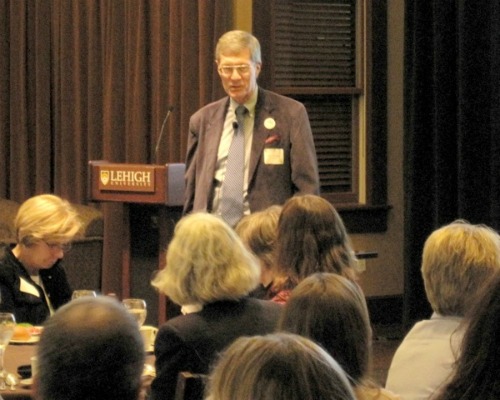Renowned educator: Shared first year experience key to student success
The benefits of a shared learning experience in a student’s initial year of college were extolled in a talk delivered by John Gardner, the renowned educator who is considered the “father of the first year experience.”
Gardner, a Senior Fellow of the National Resource Center for the First-Year Experience and president of the Gardner Institute for Excellence in Undergraduate Education, came to Lehigh for a three-day visit with faculty and staff to discuss a proposed shared first year course, which is an outgrowth of the university’s strategic plan.
A three-hour symposium in Lamberton Hall Wednesday afternoon drew nearly 130 faculty and staff members.
Gardner’s visit to campus was planned by the First Year Experience Front Runner Group, which is led by MJ Bishop, associate professor of education and human services, and Allison Gulati, associate dean and director of strategic initiatives in the Dean of Students office.
The group has been working for nearly a year to develop a pilot first year experience course that will be offered to a group of 200 students next fall. Current plans are for the program to be open to all first year students for the Fall 2013 semester.
Gardner reviewed data that supported the finding that students who take specific first year experience courses stay at a university longer, have higher levels of satisfaction, are more likely to interact with faculty outside the classroom and are more inclined to access student support services. They are even more likely to make wiser decisions in their personal lives as a result of a shared first year experience.
These “linked learning communities,” he said, are shown to have a lasting impact on the students who are enrolled in cohort experiences. Gardner also reviewed his findings from a national survey of efforts to improve undergraduate success and retention, which also measured outcomes of first year seminars. Benefits included improved connections between students, improved retention and/or graduation rates, higher levels of academic achievement and improved critical thinking skills.
Too much information, not enough time
Gardner’s presentation was followed by two panel discussions that focused on contemporary students and their pressing interpersonal, social and emotional needs, in addition to their intellectual needs.
Krista Evans, senior director of admissions, told the assembled group that she has seen the evolution of prospective students over the course of her 12 years at Lehigh. “They very much expect to be wooed and they want this to be a personal process,” she said. “They are also very involved with their parents, and many of them even describe their parents as their best friends in their essays. This is very different from what we saw even a few years ago.”
Senior finance major Andrea Lavin commented on the often “overwhelming breadth of opportunities for engagement” facing first year students—a circumstance First Year Experience Director Allison Ragon compared to “drinking out of a firehose.”
“There is just so much information for them to absorb, and not enough time,” said Ragon, who stressed the need for a balance between academics and social transition.
Both Dean of Students Sharon Basso and Ian Birky, director of Lehigh’s Counseling and Psychological Services, said many students they were in contact with were generally focused on achievement and very pragmatic and strategic about their academic choices. But they can also be impatient, intolerant of ambiguity and uncomfortable forming deeper relationships, they said.
Faculty members focused on the need for students to develop written and oral communication skills and critical thinking abilities, and to take advantage of opportunities to broaden personal and academic horizons.
“I don’t think you can underestimate the value of an overseas or international experience,” said Dan Lopresti, associate professor of computer science and engineering. “There is a perception with some majors that you can’t afford the time away to study abroad. I would argue that you can’t afford not to.”
Following Gardner’s visit, an invitation will go out to faculty to encourage submission of a course proposal that could be part of the Fall 2012 semester FYE pilot course.
Posted on:


